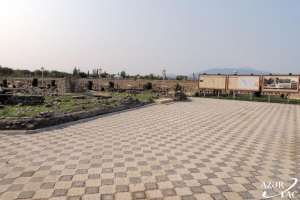


Israeli Prime Minister Benjamin Netanyahu warned Iran not to threaten Israel and to watch its own back Monday, hours after Tehran launched missiles into Syria in what was seen, in part, as a challenge to Israel.
“I have one message for Iran: Don’t threaten Israel,” Netanyahu said.
On Monday, Iran said it fired missiles against the Islamic State in eastern Syria in response to a terror attack carried by the group earlier this month in Tehran, in which 17 people were killed.
Netanyahu said Israeli forces were “constantly tracking … the activities of Iran in the region.”
Israeli concerns about Iran in Syria have mostly centered around Tehran exploiting unrest in the civil war-plagued country to set up a base to attack Israel, as well as transferring missile systems and other advanced arms to the Lebanon-based Hezbollah terror group.
“We are watching their actions and watching their words,” Netanyahu added.
Iran’s powerful Revolutionary Guard, a paramilitary force in charge of the country’s missile program, said it launched six Zolfaghar ballistic missiles from the western provinces of Kermanshah and Kurdistan. State television footage showed the missiles on truck missile launchers in the daylight before being launched at night.
While the Iranian missile attack struck a blow to the Islamic State in particular, the strike was seen as a threatening message to other enemies.
“The Saudis and Americans are especially receivers of this message,” Gen. Ramazan Sharif of Iran’s Revolutionary Guard told state television in a telephone interview. “Obviously and clearly, some reactionary countries of the region, especially Saudi Arabia, had announced that they are trying to bring insecurity into Iran.”
Speaking at his Yisrael Beytenu faction meeting on Monday, Defense Minister Avigdor Liberman said Israel was not concerned by Iran’s missile strike.
“Israel is not worried. Israel is prepared for every development. And we are prepared, we have no concerns or worries,” Liberman said.
The missile attack was the first by Iran outside its own territory in nearly 30 years, since the Iran-Iraq war of 1980-88.
General Amir Ali Hajizadeh, who heads the Revolutionary Guards’ aerospace wing, told state television: “The missiles were fired from Iran and they passed over Iraq and landed in Syria.”
Hajizadeh boasted that “firing these missiles from 600 or 700 kilometers away onto a small building… demonstrates Iran’s capacity and intelligence capabilities” against jihadist groups.














